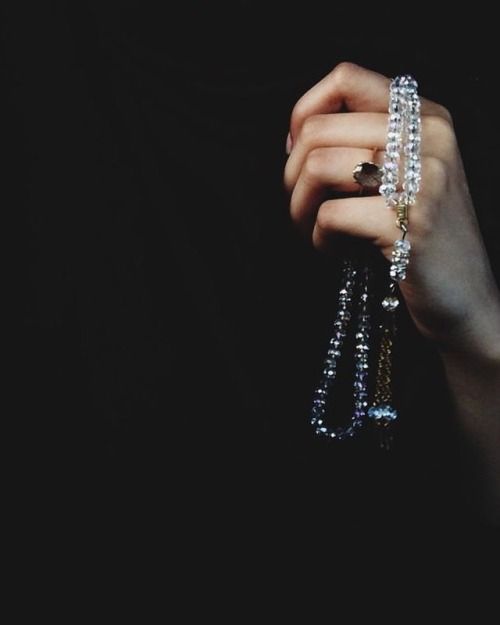As a Christian I was raised in a fairly conservative church, (as far as protestant Christian churches go). Nothing like the evangelical churches that are often featured on TV these days. There was no full band, lights, dancing and certainly no speaking in tongues and public displays of faith. The idea of seeing people raise their hands at church, or shouting out “amen” during a sermon, praying over people in groups, and laying hands on others… these were all things I was never comfortable with because I had never experienced them in my church. I was okay with faith, but the very “spiritual” stuff (often related to what Christians call the Holy Spirit) was always an area I never felt comfortable.
After I became Muslim, the mosque that I spent most of my time in was very strict and very much “Quran and Sunnah” focused. It was excellent for me, as I was craving sound knowledge. Each lecture was always packed full of hadith and ayat, as a result my love for studying hadith grew. I have mentioned previously that one of the things I love about Islam is how rational it is. The way it combines logic, and science as well as belief in the unseen and the spiritual is something I love. As a new Muslim, it was this rational aspect that appealed to me, so this kind of teaching was exactly what I desired. Lots of facts and information, courses about Fiqh (Islamic Jurisprudence) and Aqeedah ( Islamic Creed)…
The thing about that kind of mosque and that kind of teaching, is that it doesn’t focus on the spiritual relationship with Allah. There was never talk about taming of the nafs (inner desires) and the emphasis on the dhikr was rarely focused on. After we moved to Turkey the way I saw Islam being practiced was very different from what I had experienced in Canada. In many ways it felt completely the opposite to what I had been exposed to. All of a sudden there was a significant focus on the remembrance of Allah, and the spiritual side of Islam. Dhikr circles and group dhikr sessions were something I had never seen before and in honesty really scared me.
So what does this have to do with the week a woman is on her menses? A while ago I heard a short lecture from a sister about the time of the month when a woman is menstruating. She was mentioning that many sisters during this week refer to it as “being on vacation” (particularly in the West). During that week women don’t pray and this is excused by Allah. Somehow, calling it “vacation” has been adopted as a term to use, as though we are taking a holiday from a burdensome time. I thought it was interesting point, and wasn’t sure I cared that much about such semantics until she continued. She went on to say that if the average woman has her menses from age 13-55 years old, that in total it is ten years of a woman’s life that she will be menstruating. Ten years! Ten years of no prayer. When I heard that I felt so very sad and remorseful. Although we are excused from our prayer during that time, if we don’t replace it with something else during that time, we will have gone ten years of our life without intentional remembrance of Allah for those five times a day. While we are not obliged to pray the five obligatory prayers, we should still set aside time at those moments of the day for our dhikr and dua. We should not forgot the habit of consciously remembering Allah during those times. The sister doing the lecture suggested that rather than saying “I am not praying” we should consider something like “I am on my week of dhikr”. She argues that changing the mentality and even how we talk about that week, will change the mindset towards the worship.
This lecture really struck me to the core. How many weeks have I not replaced my obligatory prayer with dhikr or dua during the week I have my menses? I understand that this is something Allah will not ask me about. However, during these days of Corona when we are experiencing how much it hurts to have mosques closed or seeing the Kabbah empty, the realization of what it feels like to be distanced from Allah has been setting in. My heart hurts every time I see the image of the empty Kabbah, or hear the adhan telling people to stay home. Yet for years, I have allowed myself to put distance between me and my Lord every single month without a second thought. Will I not regret those ten years I let pass when I meet my Lord?
The thing is, I have really struggled with establishing a regular habit for dhikr. I always set goals for myself or tell myself I will be more regular in my daily dhikr, but I struggle to actually put it into practice. In the past when I have reflected on this, I have wondered if it is because of the type of church and then later mosque I was raised in. When it has come to faith and worship, so much of my life has been spent learning to practice faith in such a different way.
It has taken me many years to understand, but I have finally been able to see the balance and the beauty between the two approaches to Islam. It also just emphasizes the wisdom of Islam and our prophet (SAW) about the middle way and moderation (see my earlier writing entitled ‘Wasat’). As long as we are not compromising on the points of Islamic creed, there are places and times for focusing on the spiritual, and making such acts a priority. For me, the week during my menses is a perfect example of a time that I need to focus on such actions. I also need to recognize that unless I work to establish the habit outside of that week, I may not be as regular with it as I hope to be.
One thing I have been contemplating during the isolation from the Corona virus, and after hearing the lecture I reference above, is that I can only allow my past to be an excuse for so long… if I really want to change behaviours, I need to stop making excuses and do the work. For me this means sitting down daily and designating time to focus on dhikr and dua, so when I am on my menses, I am not “on vacation”, I will be on “my week of dhikr”.
Oh Allah make us those who remember you often. Those whose tongue is always wet with your remembrance. May we adhere to the sunnah and follow the example of our beloved Prophet SAW, and may we never take for granted the time you have give us, and the ability we have to worship You. Ameen.







JazaakAllahu khayr for this. It resonates with me so much. I remember listening to the lecture you mentioned above, and I have yet to make an impactful change. A non-negotiable time for a non-negotiable act, if you will.
May we always be in remembrance of the All-Mighty. Ameen
I like how you highlight balance and understanding its importance in Islam… There are so many times where we’re doing too much on something and lack on the other side of it… I’ve been fallen into this kind of situation before and ended up finding myself confused and seemed to be getting away from my connection with Allah, to the fact that I never really understood balance as a very important thing in Islam, I thought Islam was just all about faith in Allah, without any knowledge in worshipping Him… I thought I could be able to worship Him whatever… Read more »
Thank you for this beautiful blog. It was an eye-opener. what is the name of the lecture I am very interested to watch it 🙂 Thank you